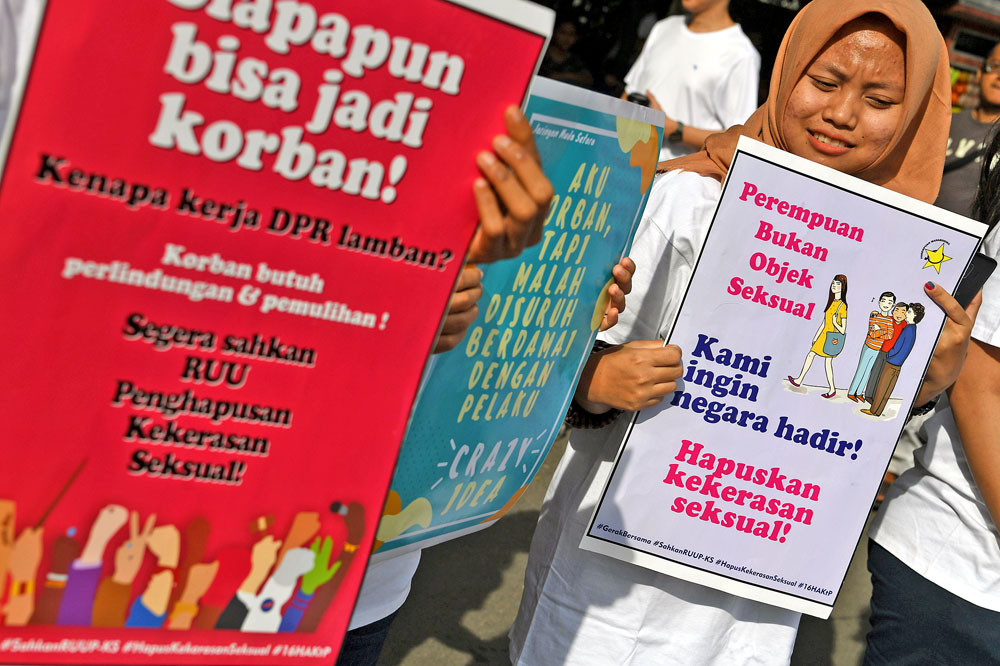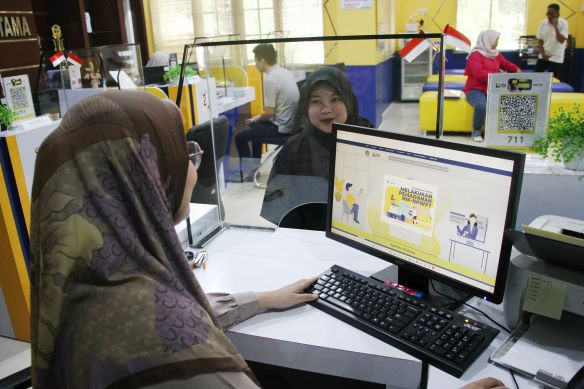Why both conservative and liberal Indonesians must support bill against sexual violence
Sexual violence is against both liberal and Islamic values. Liberal values uphold individual rights. Meanwhile, Islamic values respect women’s rights.
Change Size
 Slow motion: Activists rally at the Hotel Indonesia traffic circle in Jakarta recently to demand the House of Representatives pass an anti-rape bill immediately. Some conservative Muslims rejected the bill on sexual violence, which has been deliberated over by the House since 2016, arguing that the bill supported adultery and lesbian, gay, bisexual and transgender people. (Antara/Wahyu Putro)
Slow motion: Activists rally at the Hotel Indonesia traffic circle in Jakarta recently to demand the House of Representatives pass an anti-rape bill immediately. Some conservative Muslims rejected the bill on sexual violence, which has been deliberated over by the House since 2016, arguing that the bill supported adultery and lesbian, gay, bisexual and transgender people. (Antara/Wahyu Putro)
A
s a victim, friend and family of sexual assault victims, the latest rejection by the conservative Prosperous Justice Party (PKS) of the anti-sexual violence bill before the House of Representatives has upset me more than ever.
PKS argues that the bill’s definition of sexual violence supports liberal values that allow free and deviant sexual behaviours.
Many have pointed out the logical fallacy of the statement, saying that the bill’s definition of sexual harassment as non-consensual sex does not necessarily means allowing the consensual one, as adultery is already governed by the criminal code (KUHP).
I have researched liberal and Islamic values, and I argue that the conservatives’ claims that the bill is against Islamic teachings and blaming liberal values for sexual harassment are misleading. It is the interests of both conservative and liberal parties to eliminate sexual violence.
Liberal versus Islamic values
Societies often perceive liberal ideas and Islam as being at opposite ends of a spectrum and that the differences between the two contribute to a clash of civilisations. One aspect of this clash involves religions.
In my research into American media, secularism, individualism and liberal values promote the tradition that regards religion as a private matter. Islamic society treats religion as a public concern. Muslims not only value individual relations with God but also interaction in the public domain. Thus, Islamic religious expression is visible in the public sphere.
In the same spirit
However, sexual violence is against both liberal and Islamic values.
Liberal values uphold individual rights. Liberals believe every person should be treated equally regardless of their race, gender, ethnic group, political power and economic condition.
Meanwhile, Islamic values respect women’s rights. Every Muslim child learns how the Prophet Muhammad respects mothers before fathers. Under Muhammad’s leadership, women rights were much improved compared to previous systems. Islam also teaches respect for others and to protect the weak and the oppressed.
These values should have provided reasons for protecting women and other vulnerable groups from sexual harassment.
Facing the same problem
Being the result of the unfair gender hierarchy of men and women, the characteristics of sexual harassment cases have a striking resemblance everywhere.
Victim blaming is common in both majority Muslim Indonesia and liberal democratic United States.
One of the most common examples of victim blaming is judging what the victims wear.
In Indonesia, sexual harassment happens to women regardless of what they wear. A student at Gadjah Mada University, Agni (not her real name), was raped by her friend when she was wearing a hijab.
Baiq Nuril, a school teacher who was jailed for reporting her boss for sexual harassment, also wears a hijab.
In America, an art exhibition shows the “unassuming” clothes victims wore when they were assaulted. Other similar movements have emerged to fight against the prevalence of victim blaming.
Victim blaming also leads to women not reporting sexual harassment. This happens in Indonesia and in the US. Victims also deal with physical and psychological trauma as well as financial loss.
Why the rejection?
Liberals and Muslims are fighting for the same cause to protect women’s rights. So, the call from Indonesian Muslim conservatives to reject the anti-sexual violence bill for promoting liberal values is questionable.
From its history, PKS’s rejection could be seen as a political move to attract voters in a nation dominated by Muslims.
Forget politics, let’s protect women
Sexual harassment problems in many countries prove that problems of gender equality are prevalent in almost all cultures.
The UN convention to eliminate discrimination against women was first adopted in 1979. Some 189 countries, including Indonesia, have since ratified it.
Indonesia, however, is behind in dealing with sexual violence against women. Neighbouring countries such as India and the Philippines have already issued anti-sexual violence regulations.
Conservative Muslims should not ignore the real problem behind sexual violence in Indonesia, which is the subordination of women. They should forget about politics and focus on providing justice, recovery and protection for victims, as the anti-sexual violence bill proposes.
They also should understand that liberals are not at fault as they are fighting for the same cause.
Therefore, it is better to focus on our shared interests, rather than contradictions, in the fight against sexual violence.
Whether we are a conservative, a liberal, a victim, a friend or a family of victims, let’s do this together. The more, the better, isn’t it?
Alia Azmi is a lecturer of International Relations, Universitas Negeri Padang.
This article was firstly published on The Conversation. Read the original article.









